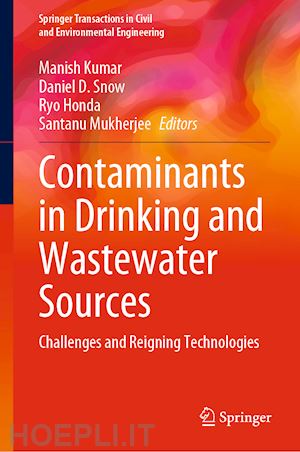
Questo prodotto usufruisce delle SPEDIZIONI GRATIS
selezionando l'opzione Corriere Veloce in fase di ordine.
Pagabile anche con Carta della cultura giovani e del merito, 18App Bonus Cultura e Carta del Docente
This volume takes a multidisciplinary approach to study and evaluate the global human vulnerability to the exposure of contaminants of emerging concern (CECs) in the natural environment. It provides a comprehensive resource on structurally diverse groups of chemical compounds that have adverse effects on the aquatic environment. It explores the global strength, environmental status, chemical risk assessment and management strategies of CECs with relevant modern techniques. The principle focus is on concurrent emerging water quality issues. It defines the impacts of the environmental exposure of trace concentrations of CECs and/or their metabolites and discusses possible technological advances to combat the emerging pollutants. It will be useful to researchers, multi-stakeholder expert groups, policymakers, and graduate students.
Dr. Manish Kumar is a faculty at Discipline of Earth Sciences at Indian Institute of Technology Gandhinagar, Gujarat, India. He earned his Ph.D. in Environmental Engineering from the University of Tokyo, Japan, and has been the recipient of prestigious fellowships like Water Advanced Research and Innovation (WARI) Fellowship, Japan Society for the Promotion of Science (JSPS) foreign research fellowship, Brain Korea (BK)-21 post-doctoral fellowship, Monbukagakusho scholarship, Linnaeus-Palme stipend from SIDA, Sweden, and Research Fellowship from CSIR, India, etc. Dr. Kumar is active in the fields of hydro(bio)geochemistry, contaminant transport and modeling, metal speciation, isotope fingerprinting, emerging contaminants and removal. He supervised 6 Ph.D. thesis and more than 20 Master’s dissertations. He has published over 80 papers in international peer-reviewed journals and has 17 years’ research/teaching experience.
Dr. Dan. D Snow is a Research Professor in Natural Resources at the University of Nebraska, and the Director of the Water Sciences Laboratory, a part of the Nebraska Water Centre and Daugherty Water for Food Institute. His research is focused on the use of analytical chemistry and mass spectrometry to understand how water becomes contaminated and what we can do to prevent it. A good part of his work in the Water Sciences Laboratory involves creating analytical methods for new or "emerging" environmental contaminants like steroids, pharmaceuticals, algal toxins, explosives, and pesticides. In 2015, his team was awarded with Excellence in Environmental Engineering and Science Grand Prize by American Academy of Environmental Engineers and Scientists.
Dr. Ryo Honda is a research Associate Professor in the faculty of Geosciences and Civil Engineering, and an adjunct professor of Research Centre for Sustainable Energy and Technology of Kanazawa University, Japan. His field of interest includes but are not limited to Environmental Process Engineering, Environmental Microbiology, Environmental and Energy Technology and Urban Engineering etc. He has been awarded with accolades such as WET Excellent Paper Award from Japan Society of Water Environment. His research area focuses on environmental process engineering, environmental microbiology, and sustainability science. In addition to many international publications to his credit, he is on the reviewer board for publications of national and international repute.
Dr. Santanu Mukherjee obtained his Ph.D. from the University of Bonn and worked as a guest scientist in FZJ, Juelich. He was a visiting researcher in Savannah River Ecological Laboratory, USA. He is the recipient of multiple accolades such as EGU-Young Scientist Travel Award, ICAR international fellowship, GRIFA (Italian Pesticide Agency) grant, EU-COST action biochar grant, etc. His research interest includes the fate of emerging contaminants, the role of dissolved and particulate organic matter in deciding contaminants fate in the environment.











Il sito utilizza cookie ed altri strumenti di tracciamento che raccolgono informazioni dal dispositivo dell’utente. Oltre ai cookie tecnici ed analitici aggregati, strettamente necessari per il funzionamento di questo sito web, previo consenso dell’utente possono essere installati cookie di profilazione e marketing e cookie dei social media. Cliccando su “Accetto tutti i cookie” saranno attivate tutte le categorie di cookie. Per accettare solo deterninate categorie di cookie, cliccare invece su “Impostazioni cookie”. Chiudendo il banner o continuando a navigare saranno installati solo cookie tecnici. Per maggiori dettagli, consultare la Cookie Policy.